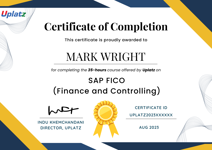
Chief Executive Officer (CEO) Premium Career Track
Program consisting of courses to help you fulfil your dream of becoming a C-Level Executive (CEO) in a top organization
Uplatz
Summary
- Uplatz Certificate of Completion - Free
Add to basket or enquire
Overview
Uplatz provides this intense Premium Career Track program on Chief Executive Officer (CEO). It is a program covering all topics related to managing an organization, as self-paced video lectures. The program will help you pursue a career towards becoming a CEO. You will be awarded Course Completion Certificate at the end of the course.
This Premium Career Track - Chief Executive Officer (CEO) program by Uplatz includes the following courses:
- Leadership and Management
- Project Management Fundamentals
- Product Management
- Fundamentals of Marketing
- Fundamentals of Digital Marketing
- Microsoft Project
- Microsoft Project (basic to advanced)
- Business Intelligence and Data Analytics
- Microsoft Excel
- Google Sheets
The Chief Executive Officer (CEO) is the highest-ranking executive in an organization and holds ultimate responsibility for its overall success and performance. The CEO is typically appointed by the board of directors and reports directly to them. The role of a CEO can vary depending on the size and nature of the organization, but some common responsibilities include:
Setting Vision and Strategy: The CEO is responsible for defining the organization's vision, mission, and long-term strategy. They align these with the company's values and ensure that all decisions and actions support these goals.
Leadership and Management: As the top leader, the CEO provides direction and guidance to the executive team and the entire organization. They foster a positive work culture, set performance expectations, and motivate employees to achieve their best.
Board Relations: The CEO works closely with the board of directors, keeping them informed about the organization's performance, seeking their guidance on major decisions, and ensuring alignment with their goals.
Financial Management: The CEO oversees financial performance, ensures budgets are met, and makes strategic financial decisions to maintain the organization's financial health.
Stakeholder Relations: The CEO represents the organization to various stakeholders, including investors, customers, partners, and the media. Building and maintaining strong relationships are vital for the organization's reputation and success.
Risk Management: The CEO identifies and manages risks that could impact the organization's success. They work with the executive team to create contingency plans and mitigate potential threats.
Business Development: The CEO explores new business opportunities, partnerships, and markets to drive growth and expand the organization's reach.
Performance Monitoring: The CEO monitors key performance indicators and organizational metrics to evaluate progress toward goals and make data-driven decisions.
Crisis Management: When faced with crises or unexpected challenges, the CEO takes decisive action to protect the organization's interests and lead it through difficult times.
Innovation and Adaptation: The CEO encourages a culture of innovation and continuous improvement within the organization. They adapt to changing market conditions and technological advancements.
Corporate Governance and Compliance: The CEO ensures that the organization adheres to all legal and regulatory requirements, promoting ethical conduct and corporate governance.
Succession Planning: The CEO plays a role in developing and grooming future leaders within the organization, ensuring continuity in leadership.
Public Relations and Branding: The CEO is often the public face of the organization and actively engages in public relations activities to enhance the brand image.
The CEO's role is complex and demanding, requiring a combination of leadership, strategic thinking, communication skills, and business acumen. CEOs must balance short-term goals with long-term vision, make tough decisions, and inspire employees to work cohesively towards the organization's success. Successful CEOs focus on creating value for all stakeholders, fostering innovation, and adapting to the dynamic business environment.
Course media
Description
A Chief Executive Officer (CEO) is the highest-ranking executive in a company. Although the role of the CEO will differ from organisation to organisation, your main responsibilities will include setting the overall direction of a business and managing the operations and resources of a company.
Tasks and Duties of a CEO
- Communicating, on behalf of the company, with shareholders, government entities, the public and the media.
- Creating and implementing the company’s vision and mission.
- Developing and implementing business and strategic plans and budgets.
- Evaluating the work of other executive leaders within the company.
- Maintaining awareness of the competitive market landscape, expansion opportunities and industry developments.
- Assessing risks to the company and ensuring they are monitored and minimised.
- Reporting through to the Board of Directors with accurate and timely information regarding the organisation’s overall performance, including financials, risk ratings, compliance and growth prospects.
How to become a CEO
Becoming a Chief Executive Officer (CEO) is a prestigious and challenging career goal that requires a combination of education, experience, leadership skills, and strategic vision. While the path to becoming a CEO may vary for different individuals, here are some general steps that can help you work towards achieving this position:
Education: Obtain a strong educational foundation, typically with a Bachelor's degree in a relevant field such as business administration, finance, economics, or a field related to the industry of interest. Some CEOs also pursue advanced degrees like a Master's in Business Administration (MBA) to enhance their business acumen.
Gain Experience: Build a successful career by starting in entry-level positions in your chosen field and industry. Progress through various roles and take on increasing responsibilities to gain diverse experience.
Demonstrate Leadership: Focus on developing strong leadership skills, effective communication, decision-making, and the ability to inspire and motivate teams. Seek out leadership opportunities within your organization or community.
Network: Build a strong professional network within your industry and beyond. Attend industry events, conferences, and networking gatherings to connect with other professionals and potential mentors.
Be Results-Oriented: Strive for measurable results in your roles, demonstrating a track record of delivering value to the organization and achieving business objectives.
Be Innovative and Adaptable: Demonstrate a forward-thinking mindset and the ability to adapt to changing market conditions and industry trends. Innovate and seek opportunities for growth and improvement.
Pursue Continuous Learning: Stay updated with industry trends, new technologies, and best practices through workshops, seminars, certifications, and online courses.
Seek Mentors: Seek guidance and advice from experienced professionals or mentors who have attained senior leadership positions. Learn from their experiences and seek their feedback on your career development.
Understand the Business Holistically: Aspire to understand various aspects of the business beyond your area of expertise. Familiarize yourself with finance, marketing, operations, and other functions that contribute to the organization's success.
Think Strategically: Develop a strategic mindset and the ability to see the big picture. Understand how your decisions impact the overall organization and its long-term goals.
Be Persistent and Resilient: Advancing to a CEO position may require navigating challenges and setbacks. Stay persistent, learn from failures, and continue to work towards your goal.
Consider Entrepreneurship: Some CEOs start their own businesses and become successful entrepreneurs. Entrepreneurial experience can be a valuable stepping stone to a CEO role.
Seek Executive Positions: As you progress in your career, aim for executive positions like Vice President or Chief Operating Officer (COO) to gain experience in top-level decision-making and leadership.
Pursue CEO Positions in Smaller Companies: Consider applying for CEO roles in smaller companies or startups, where you may have more opportunities to take on significant responsibilities and make a direct impact.
Remember that the journey to becoming a CEO is a long-term commitment, and it requires continuous effort, dedication, and a focus on personal and professional growth. There is no fixed timeline, and success will depend on individual circumstances, opportunities, and your ability to leverage your skills and experiences effectively.
Who is this course for?
Everyone
Requirements
Passion and determination to make it to the top of the corporate ladder!
Career path
- Chief Executive Officer (CEO)
- Chief Operating Officer (COO)
- Chief Information Officer (CIO)
- Chief Technology Officer (CTO)
- Chief Marketing Officer (CMO)
- Chief Risk Officer (CRO)
- Chief Product Officer (CPO)
- Senior Management Executive
- Managing Director
- General Manager
- Vice President (VP) of any business segment
- Head of Operations
- Head of Architecture
- Head of Corporate Governance
Questions and answers
Currently there are no Q&As for this course. Be the first to ask a question.
Certificates
Uplatz Certificate of Completion
Digital certificate - Included
Course Completion Certificate by Uplatz
Reviews
Currently there are no reviews for this course. Be the first to leave a review.
Legal information
This course is advertised on reed.co.uk by the Course Provider, whose terms and conditions apply. Purchases are made directly from the Course Provider, and as such, content and materials are supplied by the Course Provider directly. Reed is acting as agent and not reseller in relation to this course. Reed's only responsibility is to facilitate your payment for the course. It is your responsibility to review and agree to the Course Provider's terms and conditions and satisfy yourself as to the suitability of the course you intend to purchase. Reed will not have any responsibility for the content of the course and/or associated materials.



